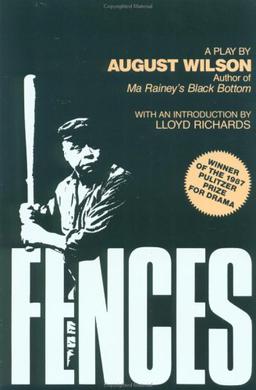
Fences (play)
Fences is a 1985 play by the American playwright August Wilson. Set in the 1950s, it is the sixth in Wilson's ten-part "Pittsburgh Cycle". Like all of the "Pittsburgh" plays, Fences explores the evolving African-American experience and examines race relations, among other themes. The play won the 1987 Pulitzer Prize for Drama and the 1987 Tony Award for Best Play. Fences was first developed at the Eugene O'Neill Theater Center's 1983 National Playwrights Conference and premiered at the Yale Repertory Theatre in 1985.
Fences
- Troy Maxson
- Rose Maxson
- Cory Maxson
- Jim Bono
- Gabriel Maxson
- Lyons Maxson
- Raynell Maxson
1985
English
The Pittsburgh Cycle
A Negro baseball league player is now a garbageman; his bitterness affects his loved ones
Drama, Fiction
1957, in a backyard of a house in Pittsburgh, Pennsylvania
Productions[edit]
Fences was first developed at the Eugene O'Neill Theater Center's 1983 National Playwrights Conference.
It premiered at the Yale Repertory Theatre in 1985, under the direction of Lloyd Richards (who was then Artistic Director of the Yale Rep), with a cast of James Earl Jones (Troy Maxson), Mary Alice (Rose), Ray Aranha (Jim Bono), Russell Costen (Gabriel), and Courtney B. Vance (Cory).[1]
The play's first Broadway production was staged at the 46th Street Theatre on March 26, 1987, and closed on June 26, 1988, after 525 performances and 11 previews. Directed by Lloyd Richards, the first Broadway cast remained largely the same as that of the Yale Rep premiere: James Earl Jones (Troy Maxson), Mary Alice (Rose), Ray Aranha (Jim Bono), Frankie Faison (Gabriel), and Courtney B. Vance (Cory). The production won the Tony Awards for Best Play, Best Performance by a Leading Actor in a Play (James Earl Jones), Best Performance by a Featured Actress in a Play (Mary Alice), and Best Direction of a Play (Lloyd Richards), as well as the Drama Desk Awards for Outstanding New Play, Outstanding Actor in a Play (Jones), and Outstanding Featured Actress in a Play (Alice). It also received Tony Award nominations for Best Featured Actor in a Play (Faison and Vance).
The first Broadway revival of the play opened at the Cort Theatre on April 26, 2010, with a limited 13-week engagement. Directed by Kenny Leon, the production starred Denzel Washington (Troy Maxson) and Viola Davis (Rose) as the married couple struggling with changing U.S. race relations.[2] The revival was nominated for 10 Tony Awards,[3][4] winning three for Best Revival of a Play, Best Actor in a Play (Denzel Washington), and Best Actress in a Play (Viola Davis).[5]
In August, 1990, the play received its premiere production in the UK by Liverpool Playhouse in association with West End producer, Bill Kenwright, in a production by Temba Theatre Company's artistic director, Alby James, starring Hollywood movie star Yaphet Kotto as the protagonist Troy Maxson, and coming star, Adrian Lester, as his son, Cory. Financial Times critic Alastair Macaulay wrote: "Congratulations to the Liverpool Playhouse for presenting this, its British premiere, and for doing it proud...' and 'The director Alby James has done wonders in making his largely English cast absolutely persuasive as these Americans."[6]
In 2013, the play was revived again in the UK by Theatre Royal Bath, starring Lenny Henry as Troy Maxson and directed by Paulette Randall. This production transferred to the Duchess Theatre in London's West End for a run that lasted between June and September 2013.[7] Henry's performance attracted wide acclaim. Giles Broadbent from the Wharf said, “Lenny Henry is immense.”[8] Charles Spencer from The Telegraph said of Henry: "He is, and I don’t use the word lightly, magnificent."[9] Jane Shilling, also from the Telegraph said: "What you don’t expect is to find Henry entirely unrecognisable in the physically and morally immense character he embodies."[10] Best of Theatre said: "You may love or loathe his comedy but it is impossible to deny Lenny Henry's determination to become a serious actor of some note."[11] Paul Taylor from The Independent said, “the performance cements Henry's status as a serious actor.”[12] Henry Hitchings from the London Evening Standard said, "He's on superb form".[13] Simon Edge from the Express said, "Henry gives a perfectly controlled performance, combining physical poise with an armoury of carefully judged vocal ticks and facial mannerisms."[14] Of the production as a whole, Hitchings commented that "Fences is dense and unsettling. It's brave to programme such a meaty, daunting piece during the summer months".[13] Camilla Gurlter from A Younger Theatre described it as “very heavy and with its nearly three hours of lost hope and broken dreams it can feel long and depressing".[15]